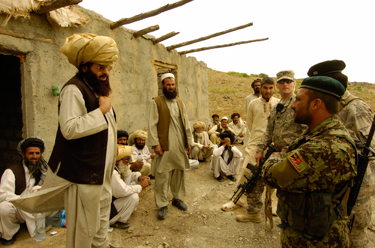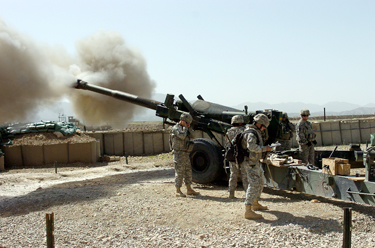Abu Company’s mission, under the command of Captain Chris Watson, was to disrupt the supply lines and stop Taliban and foreign fighters from coming into Afghanistan from Pakistan. Their other task was to provide security for giant convoys supplying U.S. Army outposts all over eastern Paktika province.
 The war here is a game of cat and mouse. The Americans patrol on foot and in vehicles, trying to draw the enemy into a fight or disrupt enemy operations by their mere presence. Rocket and mortar attacks hit Margah and Boris almost daily. The rockets are announced by a distant rumble and shriek on arrival, but mortars are silent death. You don’t even realize you’re under attack until the first one explodes. Then experienced gunners can adjust their fire and “walk” the deadly shells onto their targets. In the meantime, men run for the cover of bunkers.
The war here is a game of cat and mouse. The Americans patrol on foot and in vehicles, trying to draw the enemy into a fight or disrupt enemy operations by their mere presence. Rocket and mortar attacks hit Margah and Boris almost daily. The rockets are announced by a distant rumble and shriek on arrival, but mortars are silent death. You don’t even realize you’re under attack until the first one explodes. Then experienced gunners can adjust their fire and “walk” the deadly shells onto their targets. In the meantime, men run for the cover of bunkers.
The troops generally mistrust local Afghans — Pashtuns, whose only real alliance is to their tribe. Even during shuras — regular meetings with village elders — the tension is palpable. Those who want to cooperate don’t dare, for fear of a knock on the door late at night from the Taliban. The bazaar just outside of Boris is an example. The people simply glare at the Americans when they patrol there, barely concealing their disdain and hatred. Many of the young soldiers lump all Afghans into the group that supported bin Laden and treat them with equal contempt.
Even with Abu Company at full strength, theirs would be daunting tasks. Abu Company these days has 85 men, compared to its full strength of around 150. At full strength, the company might be able to go on longer missions and take the initiative in bringing the war to the insurgents.
Beyond the geography and troop shortages, Abu Company’s mission is greatly complicated by tribal politics. Most of the smuggling routes in the region are controlled by the powerful Haqqani tribe. Through the generations, tribal groups like the Haqqanis have alternately fought and collaborated with the foreign powers and central governments that tried to control them. Clan and trade alliances go back centuries. When legitimate trade didn’t bring in enough money, the clans turned to smuggling and drug running.
 Watson, who as an enlisted man fought in the “Black Hawk Down” rescue in Somalia, was no novice to combat action. And as in Mogadishu, he was used to fighting with a unit that was not at full strength and on the enemy’s home turf.
Watson, who as an enlisted man fought in the “Black Hawk Down” rescue in Somalia, was no novice to combat action. And as in Mogadishu, he was used to fighting with a unit that was not at full strength and on the enemy’s home turf.
A key part of fighting under those conditions is artillery and air support. And for Abu Company at Boris and Margah, artillery meant Stephen Peacock, whose gun crews operated 155mm howitzers from Boris.
“Smoke” Peacock joined the Army right out of Portland’s Fort Campbell High School in 1985. He initially enlisted in the National Guard and then joined the regular Army in 1987.
The Army sent him to Fort Sill, Okla., for basic training, and he stayed for artillery school. He initially trained on 105mm howitzers but would eventually be proficient in all the gun systems in the Army. Three deployments in 12 years — two in Iraq and one in Kosovo — would eventually cost him his marriage. He was divorced in 2005. Now he’s married to Lisa, who works helping families of soldiers, both those stationed in the U.S. and deployed overseas. Peacock’s son Brian turned 18 in May and has followed his dad into the Army and the artillery. The sergeant hopes that they’ll get to serve together someday.
Peacock didn’t get his nickname from his chain-smoking habit. It’s the traditional nickname for platoon battery sergeants, dating back to the Civil War, when battery commanders had to walk in front of the guns, clear of their smoke, to observe shell impacts.
Troop strength problems affect Peacock and his gun crews as well. With the end of the hated “stop loss” orders that forced soldiers to keep serving beyond the end of their enlistments, the Army forgot to subtract departing soldiers when they figured his unit’s needs. Before leaving for Afghanistan, he got to train his new gun crews for only two weeks. Weathered and tan, he demands perfection from his soldiers and is merciless in his criticism of them. In Afghanistan, lives depend on them getting it right every single time.
Gus Griechen had already signed up for classes at the University of Alaska when he changed his mind and joined the Army, headed for the infantry. His dad was very proud, Griechen said, but his mom was sad and worried. So he relented and told her he would become a medic instead. She died from cancer on his birthday in 2009, six months before he deployed to Afghanistan — never realizing, he suspects, that a combat medic’s job puts him in the thick of any fighting.
In the two Apaches that provided crucial air support on the mountain that day in June, both gunners were women — two of four women in the Apache squadron, based about 30 minutes’ flight time from Boris. All four take turns with their crewmates at piloting and operating the 30mm cannons. And while the women in the unit are particularly known for their deadly gun skills, they take exception, not surprisingly, to being picked out for their gender. In one way, though, their gender does matter: They give out minimal personal information because they’ve been told that their gender would cause them to be targeted by the insurgents. Of the two gunners that day, one was a short, slim brunette; the other a tall, blonde, snuff-dipping single mom. The two shared another characteristic: When they talked about their work in the Apaches, they talked with the passion of those dedicated to jobs they love.
Josh Sommers, a rifleman on his first deployment, loves rap and hip-hop music and has no use for ignorant people. According to friends, he has “mad skills” at the Diablo and World of Warcraft computer games.
When 2nd Platoon arrived at Margah from Boris, they got a too-warm welcome. A mortar exploded about 400 meters away while the two huge Chinooks were still unloading the troops. As the troops ran for cover and the birds lifted off, another round hit where the helicopters had just been, destroying some equipment.
{gallery}01122011{/gallery}











